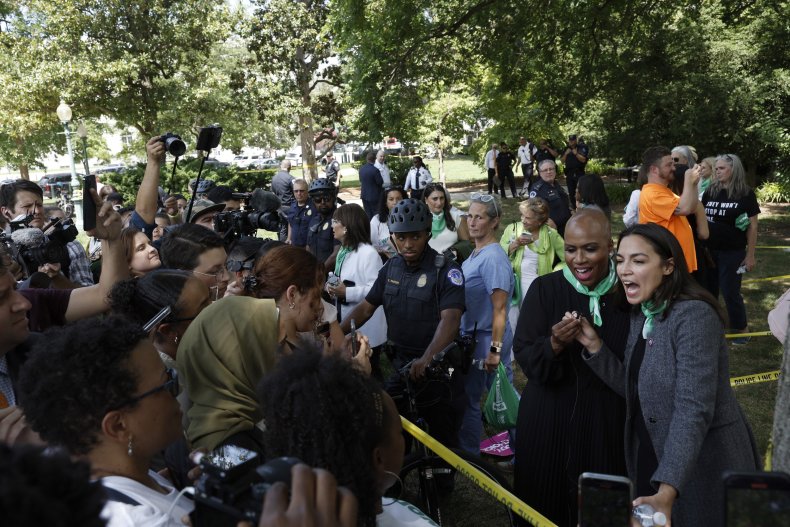Video of Representatives Alexandria Ocasio-Cortez and Ilhan Omar went viral on Tuesday which seemed to show the two Congresswomen pretending to be handcuffed as police escorted them away from a pro-abortion protest. Both Representatives were led away peacefully but seemed to be feigning being cuffed, walking with their hands clasped behind their backs, only to raise their fists defiantly a few moments later.
Staff confirms this is video of Rep @ilhanmn under arrest and in handcuffs , she and other female Members were arrested in a protest supporting abortion rights in front of the Supreme Court today pic.twitter.com/2RwOAq6U2J
— esme murphy (@esmemurphy) July 19, 2022
The Congresswomen were indeed arrested, per Capitol Police, alongside 14 other House Democrats, but there were no handcuffs. The arrest consisted of being led by police to a shady area and fined $50, though the dramatic antics and histrionics of the Congresswomen, their staff, and their media sycophants would have you believe that they were under serious duress.
Omar’s team even seems to have “confirmed” to one reporter the falsehood that she was handcuffed, while media coverage of the event has so far been intentionally misleading, with photos of the Congresswoman from the front seeming to back up their acting as fact and portraying their actions as heroic, despite them being a clear media stunt.
It would all be quite astonishing—if it weren’t quite so commonplace. Performative duress is now a common mode of operation for a new generation of politicians who have been shaped by social media and are armed and ready with the toolkit of the digital influencer. Moments like this serve as a reminder of how the advent of social media and the impact it has had on the attention economy is now enabling our politicians to reframe their political aims in emotional terms, recasting what should be politics as little more than careerist sentimental posturing.
The Congresswomen’s antics perfectly encapsulate how the performative conventions of social media—with staples like virtue signaling and self victimization—are infecting the way our politicians conduct and aggrandize themselves in public. Every moment is now a potential performance to an imaginary audience, their hands willingly held behind their backs to perform for the cameras and their fists raised in the air to signal to their fans.
AOC is especially adept at the art of influencer antics, her infamous Met Gala “Tax the Rich” dress yet another example of a media stunt dressed up as a political statement that was designed to stir up controversy and bolster her image as an underdog—even though she is a Congresswoman in the most powerful nation on earth. Another classic of this genre was the famous photo of her dressed all in white crying outside of a migrant detention center.

Anna Moneymaker/Getty Images
Today again we saw this tactic used, with lawmakers feigning being handcuffed for pro-abortion activism instead of, you know, legislating the right to an abortion, something they alone have the power to do.
This is no accident: Social media has given our politicians the power to generate spectacles and dramatic, emotional scenarios that reframe their power in emotional, rather than political terms. It allows them to create the illusion that they are on the same level as the people who they represent, whose only power is activism; in other words, their activism is cosplay, pretending they are no longer the representatives we elect to serve our interests but instead our social media friends, our influencers, our source of entertainment and aspirational consumption.
Expect more of this. This blurring of the lines between the simulacra of social media and real life politics is now the future of political public relations, and it will inevitably shift the way politicians and representatives conduct themselves in the public sphere.
AOC’s history of self-victimization, emotional appeals, and confessional style on Instagram are straight out of the influencer handbook and have worked to enhance her power, not only as a political figure but also as a fixture of the media cycle whose influence grows through controversial stunts and emotional exhibitionism.
AOC isn’t a politician; she’s a polinfluencer, adept at stirring the emotional current of the public using sentimental spectacle. This is precisely why this mode of operation is currently being enthusiastically embraced by those in power who are savvy enough to see its potential.
The collapse of the political into the emotional is great news for people like AOC. Unfortunately, turning constituents into adoring fans means you have little incentive to do anything for them in return but pose.
Angie Speaks is the cohost of the Low Society Podcast.
The views expressed in this article are the writer’s own.
George is Digismak’s reported cum editor with 13 years of experience in Journalism